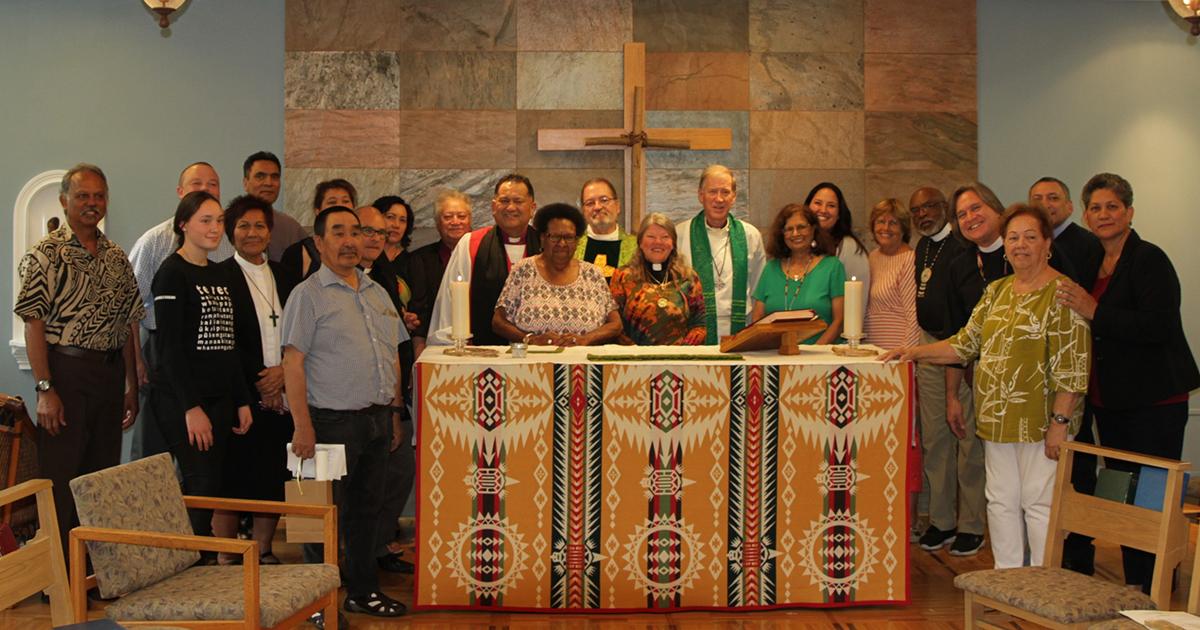Indigenous Anglicans from around the world recently met in southern Ontario to discuss issues affecting Indigenous people within and across national (political) borders. Climate change and intergenerational trauma were two of the main issues that came under discussion, as well as the shared striving towards self-determination for Indigenous peoples.
The conference of the Anglican Indigenous Network (AIN), which meets every two years, took place on the territory of the Six Nations of the Grand River and in Toronto from Aug. 28-Sept. 3. Delegates included Indigenous people from the Anglican Church of Aotearoa, New Zealand and Polynesia, The Episcopal Church in the United States and Hawaii, the Anglican Church of Australia and Torres Strait Islands, and the Anglican Church of Canada.
Discussions in a sharing circle format underscored progress that has been made and the many challenges that still remain for Indigenous people around the world. Among the 29 delegates was a 10-person contingent from the Anglican Church of Canada, who signed the resulting communiqué on behalf of Indigenous peoples within the church.
“I think that the level of support and encouragement for each other was really at an all-time high,” National Indigenous Anglican Bishop Mark MacDonald said. “I think people were … very supported by it, very encouraged by it.”
Bishop MacDonald said delegates from other countries were “very supportive of Canada and they were very impressed [by] the Primate and his knowledge and understanding of Indigenous issues, of his engagement in the issue of self-determination … and felt that we were close to taking some important and significant steps.”
Accompanying the Canadian delegation was Melanie Delva, reconciliation animator for the Anglican Church of Canada, who was present as an observer and guest.
“I was particularly moved to be welcomed so fully as a non-Indigenous guest,” Delva said. “There are so few places where Indigenous Anglicans can get together and just be together as Indigenous peoples, so to be embraced and fully included was really touching.
“I was struck by the common themes of struggle and resilience—no matter where the presenter was coming from geographically, Indigenous peoples consistently bear the brunt of climate change and the ongoing effects of colonization.”
A particularly informative part of the meeting was hearing about the experience of Maori self-determination. Within the Anglican Church of Aotearoa, Maori have equal power and authority to the Pākehā (non-Maori) church, which includes equal votes at synods and other decision-making bodies, and equal rights to decide on the distribution of resources.
“The Maoris have been at this for a much longer time, and they are [at a] more mature development of self-determination,” Bishop MacDonald said.
“That is encouraging, but also it helps us to understand where we want to go and what we want to do in a different way. They could see that and were supportive of the way in which we’re proceeding ahead, which is to really talk about reconciliation as being a part of self-determination.”
The communiqué that followed the conference called upon the worldwide Anglican Communion to support efforts towards reconciliation and self-determination, such as representation for the AIN on the Anglican Consultative Council and for an official observer from the latter to attend the next AIN conference in Hawaii in 2019.
Delegates also urged provinces of the Anglican Communion to adopt and implement the UN Declaration on the Rights of Indigenous Peoples, and to invite their Primates to meet with the Anglican Indigenous Network.
Read the communiqué from the 2017 AIN conference.
Interested in keeping up-to-date on news, opinion, events and resources from the Anglican Church of Canada? Sign up for our email alerts .

